Hey, friends. Barbarella here in the hustle and bustle of South by Southwest (SXSW) right in the heart of Austin, Texas. It’s that time of year when I emerge into the masses of people from all over the world and bask in all that is this festival. Of course, it wouldn’t be SXSW without movies, and DEAD MAIL transports viewers back to the days before cellphones and social media. A bound man manages to slip a message into a remote post office box before a figure closes in on him. The message lands in a midwestern post office on the desk of skilled “dead letter” investigator Jasper (Tomas Boykin) where he must determine if it’s a hoax or a genuine plea for help.
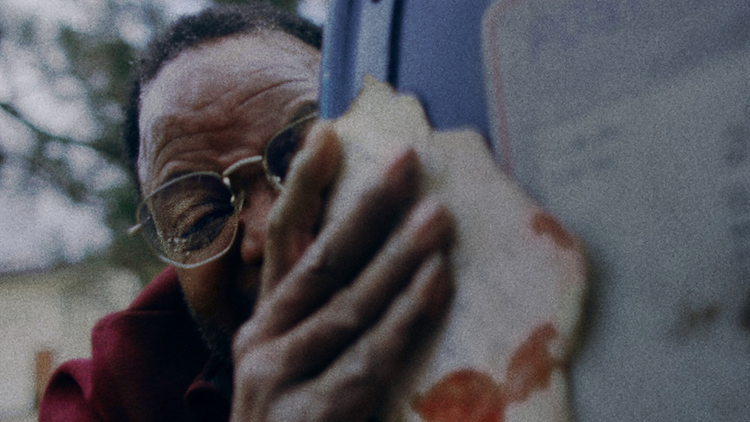 Feeling much like something shot in the late 70’s, DEAD MAIL blends retro vibes with timeless emotions like loneliness, ambition, fear, curiosity, and desperation. It stars Sterling Macer, Jr., John Fleck, Susan Priver, Micki Jackson, and Tomas Boykin, who gives such an exceptional performance as the fascinating Jasper, I want to see an entire film of Jasper’s backstory.
Feeling much like something shot in the late 70’s, DEAD MAIL blends retro vibes with timeless emotions like loneliness, ambition, fear, curiosity, and desperation. It stars Sterling Macer, Jr., John Fleck, Susan Priver, Micki Jackson, and Tomas Boykin, who gives such an exceptional performance as the fascinating Jasper, I want to see an entire film of Jasper’s backstory.
DEAD MAIL screens again this week on Wednesday, March 13 at South Lamar as part of the Visions programming. I had the opportunity to sit down with Sterling Macer, Jr., John Fleck, whom, due to sleep deprivation, I kept calling “Trent” (his character’s name), and the writing/directing team Joe DeBoer and Kyle McConaghy.
Barbara: SXSW – How does it feel to have this movie playing here?
Kyle: Still processing it. It’s really exciting. We weren’t expecting it for the film, so I feel very grateful to be here.
Sterling: To answer that question, imagine almost a year ago, you’re sitting there on the floor of somebody’s bathroom with very minimal crew, just very few people, and you’re just hoping that you can just get the scene and that you could get through, so to be sitting here at SXSW derived from that experience, it’s almost surreal. This was truly, truly independent film, truly a modest budget, which is an understatement.
John: Riffing off what Sterling just said, yeah, it’s kind of incredible – the journey from then to here and to know that there’s some bigwigs coming to see the show, and I’m saying, “God, if we were doing theater, I would be so nervous.” It’s great having a film. I don’t have to perform, so to speak; we have the fruit of our labors on screen, and they put those fruits together really well into a nice jam, if you will.
Barbara: Why synthesizers?
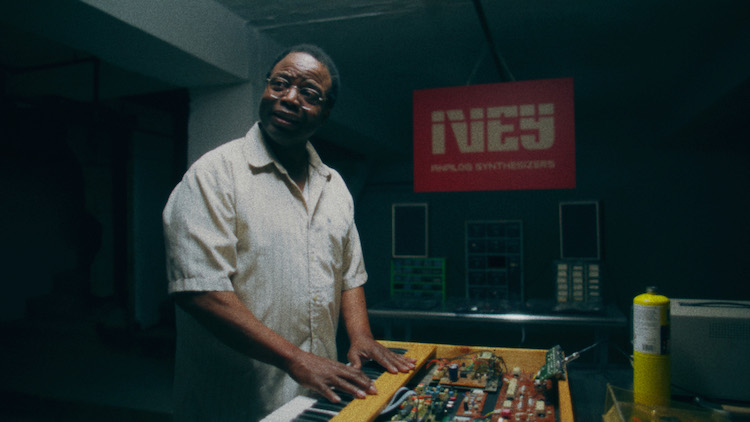 Joe: I just grew up really loving them. Loved analog and synth music in the late 70’s. When we were thinking about what Josh does for a living, let’s make him a synthesizer technician. This guy (gestures towards Kyle) used to pull them open when they break, and every now and again his tinkering would lead to a dead note playing.
Joe: I just grew up really loving them. Loved analog and synth music in the late 70’s. When we were thinking about what Josh does for a living, let’s make him a synthesizer technician. This guy (gestures towards Kyle) used to pull them open when they break, and every now and again his tinkering would lead to a dead note playing.
Barbara: Sterling, did you learn anything about synthesizers working on this?
Sterling: Yeah, I did. I wish I retained it, but I absolutely did. I find them fascinating, just in and of themselves. Being just a little older than these guys, I remember this era, and I remember having little garage funk bands, and we’re hoping that somebody has a synthesizer that we can actually use. I learned a little bit of soldering and what goes into the circuitry of synthesizer development. I mean, it’s fascinating.
Barbara: I have a question for the cowriting directing team. I’m always fascinated when people get together and work on projects. How does that work for you? What’s the process?
Kyle: Luckily, we’ve had an established process. We became friends in sixth grade. We met at recess, but yeah, we just had different creative endeavors throughout the years, and at some point, it kind of culminated into filmmaking. We love to have combined music and visuals and all the other things, so yeah, we’ve been doing that. Very lucky to have this partnership.
![[L-R] Co-Writer/Co-Director Joe DeBoer, Co-Writer/Co-Director Kyle McConaghy and Micki Jackson as “Ann,” on the set of the horror film, DEAD MAIL. Photo courtesy of Dead Mail LLC. [L-R] Co-Writer/Co-Director Joe DeBoer, Co-Writer/Co-Director Kyle McConaghy and Micki Jackson as “Ann,” on the set of the horror film, DEAD MAIL. Photo courtesy of Dead Mail LLC.](https://media.aintitcool.com/media/uploads/article_images_2022/barbarella/dead_mail__6.jpg)
Joe: We just got to a point where it’s like we’d write together, and then we’d tangent off independently, and you could easily write four or five, six pages thinking you did the greatest work in the world and then come back, and it’s like, “Well, the plot point that you just took this on is stupid,” so we kind of set a rule as we were learning how to write together of let’s just do it together. There kind of has to be cleanup that happens, but we’re really making those decisions together. It’s got to a point for me where I don’t even want to write alone because I don’t want to go the wrong direction. I’m almost in need of being able to bounce ideas off of each other, the affirmation, if you can do it well and respectfully.
Barbara: Right. Does one person sit down and type as you're bouncing ideas off each other? I’m just really curious [about the logistics].
Kyle: We always share the same Google doc. Usually, it’s just one of us - sometimes we’re both on it, but rarely. To answer your earlier question about being at SXSW, we were just talking. It’s so weird, to us this film just kind of feels like a Google doc that became a QuickTime file, and now we’re here, and people are going to watch it, and it just feels very surreal.
Barbara: This next question is for Trent and Sterling.
John: John.
Barbara: Oh, I’m sorry. Why do I keep calling you Trent?
Sterling: Trent is his character. It’s hard to distinguish them.
John: It’s okay. That’s a compliment to an actor.
Barbara: You’re not as creepy as Trent, though.
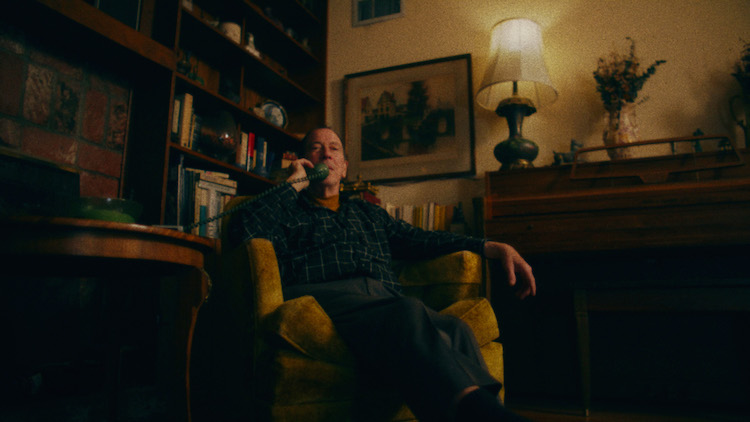 John: You don’t know me.
John: You don’t know me.
Barbara: (Feigns unease, then laughs) What was the most fun or interesting facet of your character’s personality that you explored or delved into?
Sterling: I think for me, Josh is the kind of character that I don’t often get to play because of his quiet, meticulous nature and his introspective nature. Usually, characters that I end up playing tend to be more extroverted and dynamic. It was nice to play somebody that was much more introspective and not cynical about people. That’s why Trent was able to weave his way into Josh’s life because Josh doesn’t have those defense mechanisms that so many of us walk around with. To play a character like that was really fascinating and attractive for me as an actor.
John: For me, I think this is a love story, in a way. Someone who’s built this bunker of life, so closed and self-contained, no human contact, and all of a sudden, there’s a crack, and this person appears and, ooh, I start breathing again. I’m cooking. There’s an excitement. I always wondered about that because somebody did an interview a few days ago, and she [asked], “Is there a queer element to it?” I’m a queer actor and performance artist guy, so I was looking for those connections. I never really felt it was a sexual relationship. I know a lot of people who are asexual, but there’s that love. [Trent] started to feel love again and to feel human again, it was actually that aspect [that I enjoyed exploring.]
Barbara: I want to hear the story behind the dead mail room because I think that’s really interesting.
Joe: We learned that dead letters existed, and then we read like two sentences about them, and we’re like, “Great, let’s make up our own.” We had this investigator; let’s add heaps of mail. Let’s make him amazing at solving these cases. Let’s make the criteria that there has to be valuables. Is this a help note? Is it a hoax? Let’s make that a conflict, then let’s give [the investigator] a Norwegian counterpart that has access to all this tech, so that was the first thing we wrote. It was just really fun building that. Doing some sort of investigative writing was really fun, something we hadn’t done before. That was kind of the origin, so most of it is fictitious, and he (gestures towards Kyle) has a great quote from the Postal Service after reading the script.
Kyle: To touch on Joe’s point of it being mostly made up, we tried to film at a post office in Inglewood. It was this old retro post office that would have been great for the era, and they were like, “Okay, yeah. Can you send us a script?” We sent them a script, and they said, “Look, our employees would not conduct themselves this way. You’re not allowed to film here. This is totally unrealistic.” If you look closely at the lapels, it’s not actually USPS.
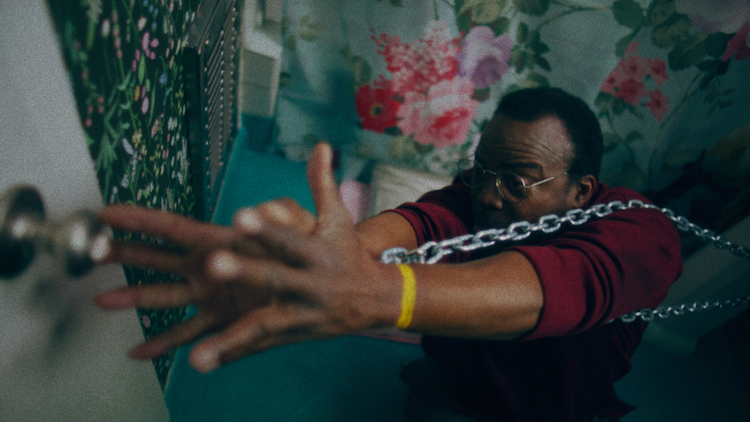 Barbara: I loved the character of Jasper. He was so great. What is his backstory? Where did this guy come from? I mean, are you gonna do a spin off, maybe?
Barbara: I loved the character of Jasper. He was so great. What is his backstory? Where did this guy come from? I mean, are you gonna do a spin off, maybe?
Kyle: We definitely kind of talked about that. That was such a fun character to write. You know we had some backstory that we kind of created for ourselves, but I think the thing that we just want to keep going back to is that clearly this is a guy with a past, someone who’s trying to move forward in life, and Tomas Boykin, who plays Jasper, does such a beautiful job. You feel like there’s more going on with him than what he says and what he does.
Barbara: Could we talk a little about the technical specs? What did you shoot on? What informed your decision to shoot it that way?
Kyle: Yeah, we had done like a couple retro-inspired films before and had some regrets, like I wish we had gone a little further and tried to do just a little more. We played it safe. This one, Joe and I had a talk. “Let’s go all-out and make sure we’re doing something that hopefully feels a little unique and feels a little specific to the period.” We ended up shooting digitally, but we use these old 1970's Zeiss speed lenses, which I think kind of led to the look. We did some stuff in post, as well, to kind of accentuate that look, but I think just the qualities these actors brought with the characters and the set designer [Payton Jane] and costume designer KerriAnne Savastano’s work all just lent itself to a non-contemporary look.
Joe: The sets, too. The practical lights on the sets just embracing them, which is kind of contrary to a lot of modern cinematography, really helped because it gave it that authentic look and feel. I think it really combined with the wide lenses and the vintage props and everything all added to the general aesthetic.
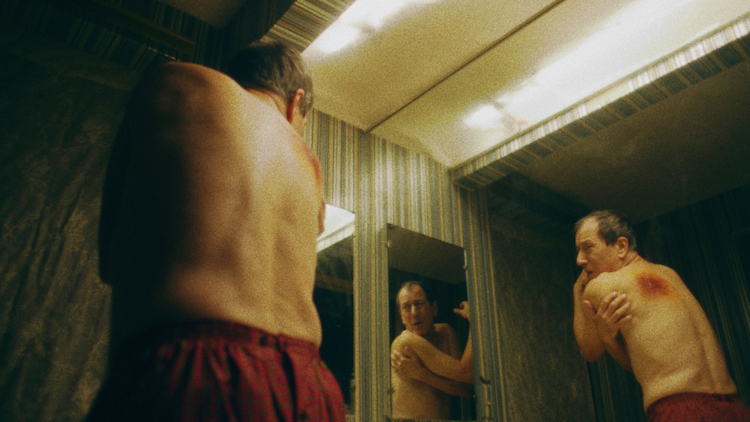 Barbara: Yeah, I felt like I was watching something from the 70’s or something. I saw the mail sortation sign and thought “Is sortation a word?”
Barbara: Yeah, I felt like I was watching something from the 70’s or something. I saw the mail sortation sign and thought “Is sortation a word?”
Sterling: It was just on the set, right?
Barbara: Yeah.
Kyle: I think that was a note we got. Someone’s like, “I don’t understand where they are.” So I’m like, “Fine. We’ll make a sign.” It might not be.
(Editor’s note: I looked it up, and it is actually a word.)
Barbara: I believe that people learn stuff throughout life [like that word "sortation" that I just learned], and on every project, you learn something new. What did each of you learn on this project?
Kyle: I think the value of working with people who are good people, good to work with. Sterling, we worked with him on a couple films and just knew what an amazing actor he was. Because his unique voice was so valuable for Joe and I, to write this character with Sterling in mind kind of helped. The greater point is, when you find people who are not only talented but also awesome humans, to find a way to keep working with them.
Joe: I think it’s easy to have a decent script, and then you got to revisit this. We really toiled over the screenplay and brought in the right collaborators, not to help with the writing, but to say, “You’re not there yet. Here’s where you lose me.” Being diligent with that before we got into production is the only way that I think the film works as well as it does.
Sterling: What I’ve learned from this is just continue to hold a high standard for the work, no matter whether it’s a well hewn production or whether it’s a production that’s just kind of scraping some resources together to tell the story. Just do the work as very best you can; bring your whole self to it. You never know where it’s going to end up.
John: I think for me it was relearning, in a way, what it’s all about, you know. Having been around for so long, back in the day doing mostly TV, it was always, “How much are you going to pay me? Nope. More, more, more.” I really connected to the joy of creativity here on a shoe-string budget, and just going for it and the passion. To be part of a higher purpose, I really felt that from the very beginning, just the joy of doing it. We crammed a lot into a short time. I wouldn’t have changed it for anything. I just loved it so much.
Sterling: One thing I want to add to that is the value of working with people, not just that you like, but whose aesthetic you share. That helps the work immeasurably. Having a bunch of heavy hitters from disparate places that you never worked with, you know, they might be great, but it’s better to work with the people who speak the same language as you.
DEAD MAIL screens again on Wednesday, March 13 at South Lamar as part of the SXSW Visions programming. Check out the trailer.
